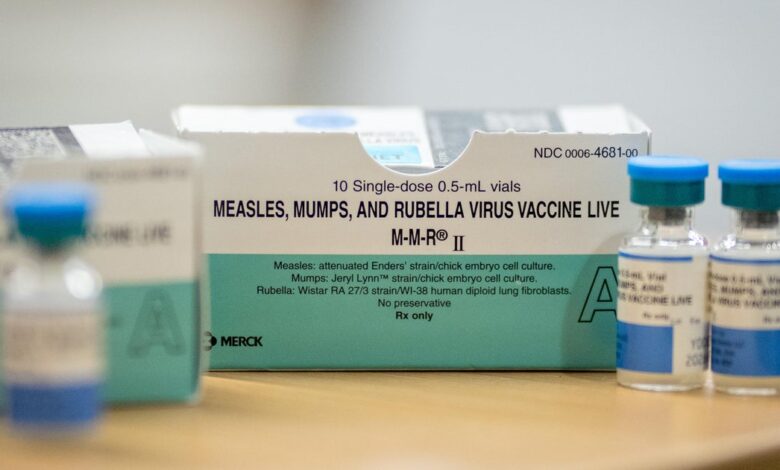Extra measles vaccine shot recommended for some travelers to Texas, other areas with outbreaks, CDC says

The Centers for Disease Control and Prevention is now backing an additional measles vaccine shot for some travelers within the United States, multiple health officials tell CBS News, in response to record outbreaks of the highly contagious virus this year.
In a letter shared with health departments on April 8, the CDC said it would now be recommending that visitors to areas affected by measles outbreaks within the United States follow stepped up vaccination guidance issued by local authorities.
Most adults still do not need an additional dose of the measles, mumps, and rubella (MMR) vaccine, the CDC says. But for “people going to or living in areas in the United States with ongoing community-wide measles transmission,” the CDC says doctors should “reassess need” for vaccination.
This means that adult and teen travelers to some counties in Texas and Kansas — the states that have updated their recommendations — should get a second dose if they have not received two doses already or get two doses if they are unvaccinated. Infants should get an early first dose before the typically recommended age of 12 months old, followed by two more doses, and children over 12 months old should get an early second dose if they already have one, or two doses if they are unvaccinated.
Previously, the CDC had said that one dose of the measles vaccine or other evidence of immunity was “sufficient for most adults.”
But the CDC has long had stepped up recommendations for Americans preparing for international travel. Under those recommendations, children over 12 months old, teenagers and adults should have two doses if they do not have other evidence of immunity, and infants should get an early first dose.
Local outbreaks of the virus have also been reported to the CDC from New Jersey, Georgia and Ohio, the agency said last week. Other states have since reported local spread, including Indiana and Colorado.
More than 600 measles cases across at least 21 states have been reported so far this year, the most since a record 2019 wave of the virus that reached 1,274 cases nationwide. Two unvaccinated children in Texas, and an unvaccinated adult in neighboring New Mexico, have died.
While the CDC said that health departments could share the updated guidance with providers in their state, it is unclear why the agency did not publish their latest recommendations on its own website. A bulletin issued by the agency on April 8 about measles did not mention the new vaccination recommendations for domestic travel.
“CDC’s clinical vaccination guidance for measles outbreaks has not changed. During measles outbreaks, health departments may provide additional recommendations to protect their communities,” a spokesperson for the agency said in a statement.
They said that the decision to offer an early dose of vaccine to young children “should be made carefully after weighing the risks of the potential long-term impact of lower immune responses” compared to the benefit of early protection.
“There are no recommendations to receive a third dose of MMR vaccine during measles outbreaks,” the spokesperson said.
Who should get another measles shot?
Vaccination of visitors to areas affected by outbreaks should follow the same recommendations issued by health authorities for those areas, which are being published on the agency’s website, the CDC told doctors.
So far, only two states — Texas and Kansas — are listed by the CDC as having issued “updated outbreak recommendations” in response to the virus, which are broken down by age for most residents.
The states say in counties facing outbreaks, adults and teenagers should get a second dose if they’ve only had one previously. If they are unvaccinated, they should get one dose immediately, followed by a second dose at least 28 days later.
Infants 6 to 11 months old should get an early first dose, the recommendations say. They then should receive a second dose at 12 to 15 months and a third at 4 to 6 years old.
Children over 12 months old who have one dose should get an early second dose, as long as it’s been at least 28 days since the first. If they haven’t been vaccinated, they should get one dose immediately, followed by another at least 28 days later.
Additionally, individuals born between 1957 and 1968 who received an older MMR vaccine, are recommended to get at least one dose of the current vaccine. Texas recommends those individuals get two doses.




